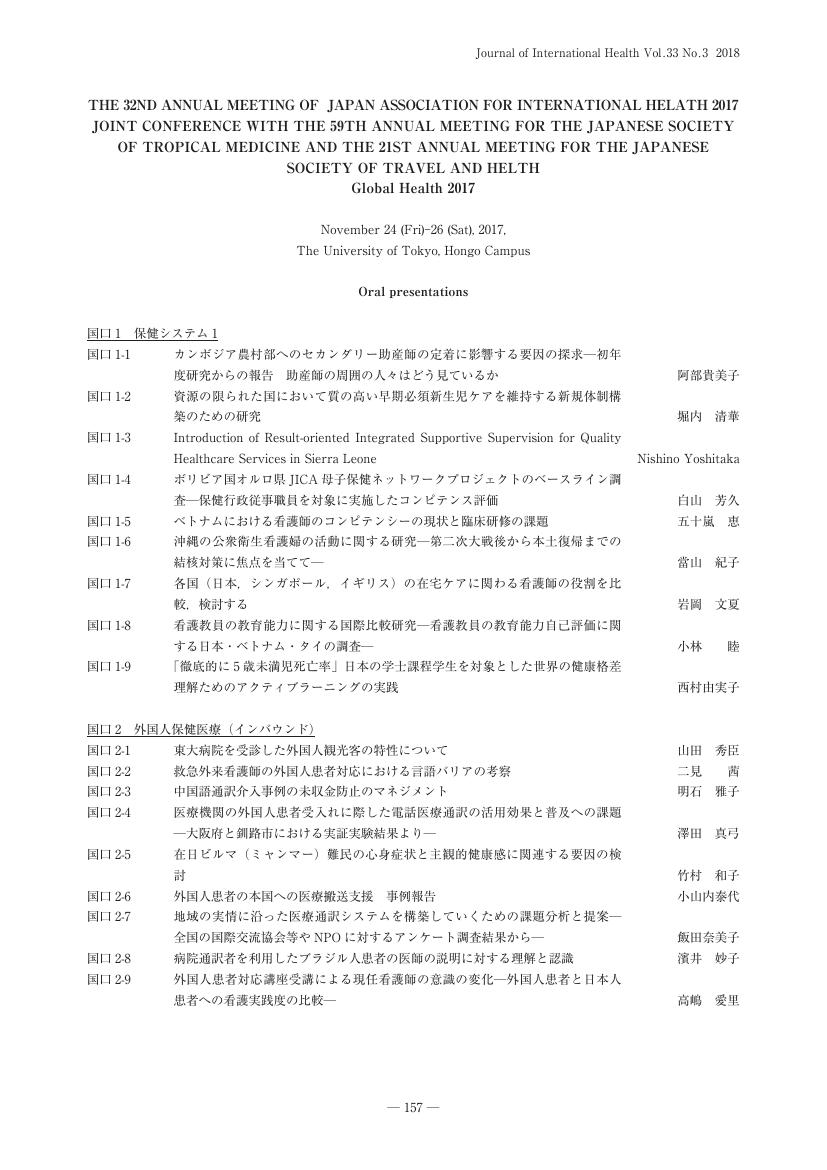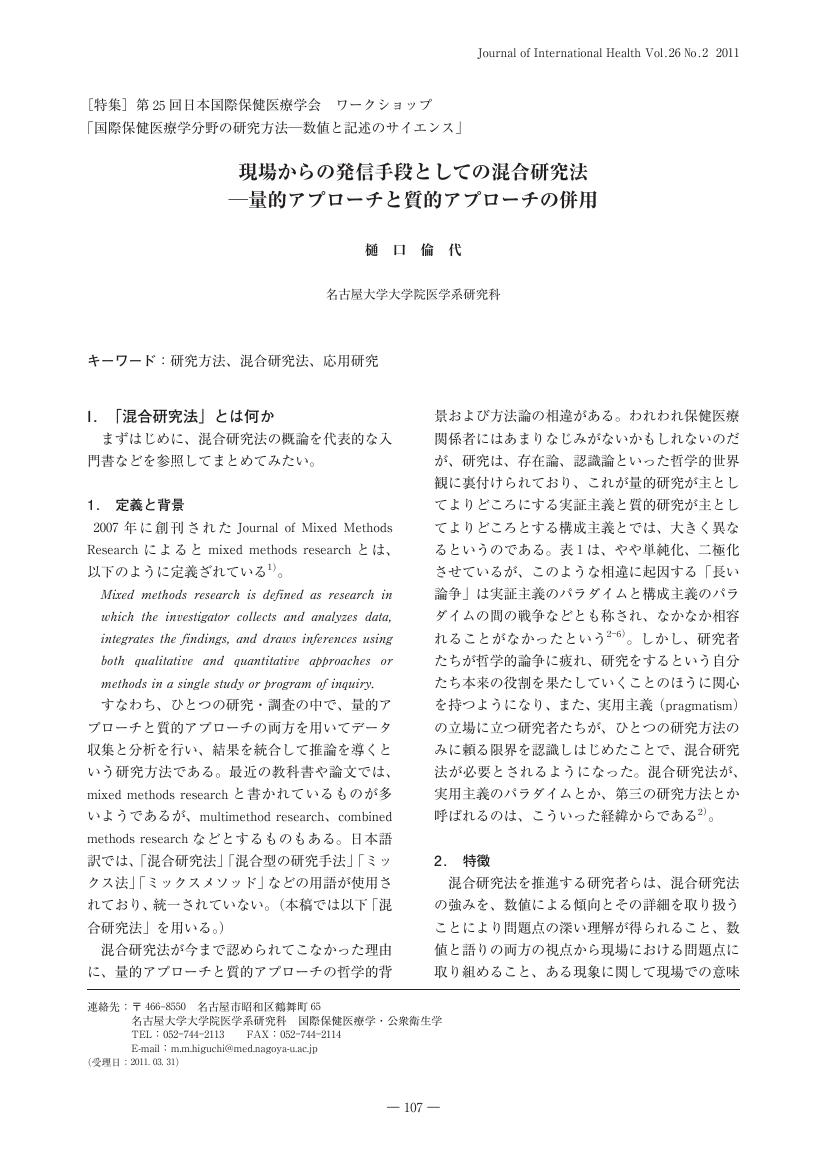32 0 0 0 OA 2008年のノーベル医学生理学賞
- 著者
- 玉城 英彦
- 出版者
- 日本国際保健医療学会
- 雑誌
- 国際保健医療 (ISSN:09176543)
- 巻号頁・発行日
- vol.24, no.1, pp.43-45, 2009 (Released:2009-04-28)
- 参考文献数
- 1
- 著者
- Machiko Higuchi Chandani Liyanage
- 出版者
- 日本国際保健医療学会
- 雑誌
- 国際保健医療 (ISSN:09176543)
- 巻号頁・発行日
- vol.31, no.2, pp.113-121, 2016-06-20 (Released:2016-07-21)
- 参考文献数
- 37
Objectives This study aimed at describing primary healthcare (PHC) providers’ opinions and attitudes about non-communicable disease (NCD) prevention in Sri Lanka and to suggest methods to increase their competence in preventing NCDs.Methods Using purposive sampling, in-depth interviews were conducted among 25 PHC providers: 7 public health nursing sisters (PHNSs), 7 public health inspectors (PHIs), and 11 public health midwives (PHMs) in the western province of Sri Lanka. The interviews were transcribed verbatim and the data were thematically coded. Results Three major areas regarding PHC providers’ perceptions of NCD prevention and control were identified: insufficient knowledge and training regarding NCD prevention, integrating NCD prevention into MCH activities, and insufficient resources and facilities for NCD prevention. All respondents expressed interest in implementing NCD prevention measures as part of their daily routine. However, insufficient knowledge of NCDs prevented them from playing an active role in NCD prevention and control. PHMs described that they could integrate health education about NCD prevention with their existing duties if they were knowledgeable on strategies to handle it in the field. They recognized that unmet PHNS and PHM quotas caused to hinder their delivery of appropriate services and that they could prevent NCD more effectively by delivering better services if they were provided basic data on NCD of the areas they were in charge of.Conclusion The PHC providers recognized that they had insufficient knowledge and numbers of PHC providers to deliver services to control and prevent NCDs in the communities. Our findings suggest that it is important to provide sufficient training to PHC providers. In addition, there is a need to increase the numbers of PHC providers and improve facilities of medical officer of health (MOH) office. Moreover, the accessibility of basic NCD data from every administrative division is needed to achieve effective practices regarding NCD prevention and control in Sri Lanka.
14 0 0 0 OA 「手洗いの疫学とゼンメルワイスの闘い」書評
- 著者
- 谷村 晋
- 出版者
- 日本国際保健医療学会
- 雑誌
- 国際保健医療 (ISSN:09176543)
- 巻号頁・発行日
- vol.34, no.1, pp.49, 2019-03-20 (Released:2019-04-05)
9 0 0 0 OA 在日外国人女性の日本での妊娠・出産・育児の困難とそれを乗り越える方略
- 著者
- 橋本 秀実 伊藤 薫 山路 由実子 佐々木 由香 村嶋 正幸 柳澤 理子
- 出版者
- 日本国際保健医療学会
- 雑誌
- 国際保健医療 (ISSN:09176543)
- 巻号頁・発行日
- vol.26, no.4, pp.281-293, 2011-12-20 (Released:2012-02-04)
- 参考文献数
- 26
- 被引用文献数
- 1
目的在日外国人女性の日本での妊娠・出産・育児の困難と、それを乗り越える方略を明らかにする。方法日本で出産、子育てを経験した外国人18名を対象に半構成的面接を行った。妊娠、出産と育児について、健康診断や予防接種などの受診状況や困ったこと、問題をどう克服したかなどについて自由に語ってもらった。逐語録から、テーマについての文脈を取り出しコード化した。コードの意味内容から類似性のあるものを集めてサブカテゴリを作り、抽象度の高いカテゴリを作成、コアカテゴリを抽出した。結果在日外国人女性の妊娠・出産・育児の困難では、≪育児の不安・ストレス≫、≪周りとのつながりの問題≫、≪社会・経済的問題≫、≪妊娠・出産・病気の不安≫、≪日本語による情報伝達困難に起因する問題≫、≪日本の保健医療についての理解の困難≫、≪出産国の選択≫の7つのコアカテゴリが、困難を乗り越える方略では≪自分で何とかする≫、≪家族に助けてもらう≫、≪友人や近所の人に助けてもらう≫、≪感情の表出≫、≪通訳の利用≫、≪日本の保健医療システムの利用≫、≪日本以外の保健医療システムの利用≫、≪やり過ごす≫の8つのコアカテゴリが抽出された。このコアカテゴリは次のように構造化できた。困難への対処方略の核は家族である。≪家族に助けてもらう≫中で≪自分で何とかする≫努力をする。受診を控えるなど≪やり過ごす≫こともあるが、十分な助けが得られれば、≪自分で何とかする≫方略へと移行することが可能である。家族で対処困難になると、直接あるいは友人や通訳の助けを得て、日本または日本以外の保健医療システムの利用を通じて専門家の助けを求めていた。結論外国人が保健医療にアクセスする際、日常の言葉以外にも、専門用語やシステムの理解といったヘルスリテラシーが必要となる。≪自分で何とかする≫女性の方略を支援するために、彼らの方略を理解し、強化する工夫が必要である。外国人女性は家族や友人などの支援を得て困難を乗り越えていたが、支援を得られにくい女性についてはネットワークづくりや保健医療従事者の積極的な介入が求められる。≪やり過ごす≫といったネガティブな方略や≪日本以外の保健医療システムの利用≫は、日本社会適応段階の途中とも考えられ、保健医療従事者は一概にその行動を否定するのでなく、不安を軽減するための方法として捉え、支援する必要がある。
- 著者
- 村上 仁 神田 未和 中島 玖 澤柳 孝浩 曽我 建太 濱田 憲和 池上 清子
- 出版者
- 日本国際保健医療学会
- 雑誌
- 国際保健医療 (ISSN:09176543)
- 巻号頁・発行日
- vol.35, no.1, pp.49-64, 2020-03-20 (Released:2020-04-02)
- 参考文献数
- 54
目的 本研究の目的は、日本でSDGsの保健目標(目標3)とジェンダー目標(目標5)を相乗的に達成していくために日本が取るべき具体的方策を、ジェンダー分析に基づいた日本とイギリスの比較から明確化することである。方法 日本では、ジェンダー平等を目指して活動する機関のジェンダー専門家8名と産婦人科医2名に、イギリスでは、保健とジェンダーの分野に深く関わりのある政府組織、市民社会、アカデミアから9名に、性と生殖に関わる健康・権利ならびにジェンダーに基づく暴力対策の現状につき、詳細面談および文献調査を実施した。テープ起こしをした原稿につき、質的内容分析を実施した。結果 「避妊・人工妊娠中絶」、「性感染症対策」、「性教育」、「婦人科系がん対策」、「ジェンダーに基づく暴力対策」の各項目につき、ジェンダー視点からみた日英の現状を明らかにした。比較の結果、特に「避妊・人工妊娠中絶」、「性教育」、「ジェンダーに基づく暴力対策」につき、両国の取り組みに差が見られた。イギリスではジェンダー・トランスフォーマティブ(女性の状況の改善だけでなく女性の社会的地位を改善し、彼女たちが権利を十分に行使できることを目指す)な取り組みが行われている一方、日本ではそのような取り組みに未だ踏み出していない施策として、1)避妊法の選択肢の確保と費用の低減化(緊急避妊薬へのアクセス改善を含む)、2)人工妊娠中絶を女性の意志のみで実施できるようにすること、3)人間関係を含めた包括的な性教育の体系的な実施、4)ジェンダーに基づく暴力に対応する戦略策定の4点が明らかとなった。結論 結果から導かれた4点を進めることで、日本においてSDGsの目標3と目標5を相乗的に達成していけると思われる。そのためには、政策決定への市民社会の参画の拡大と、女性議員比率の向上が助けになると考えられる。
7 0 0 0 OA 戦後日本の「蚊とハエのいない生活実践運動」-住民参加と国際協力の視点から
- 著者
- 関 なおみ
- 出版者
- 日本国際保健医療学会
- 雑誌
- 国際保健医療 (ISSN:09176543)
- 巻号頁・発行日
- vol.24, no.1, pp.1-11, 2009 (Released:2009-04-28)
- 参考文献数
- 15
- 被引用文献数
- 2
戦後我が国で行われた保健衛生対策である「蚊とハエのいない生活実践運動」は、住民参加型開発と呼びうる地区衛生活動の一例である。これは衛生害虫を自分たちの生活の中の問題として位置づけ、住民の手で防除を成し遂げるという方法で始まったものであるが、後期にはそれを専門家の目で評価し、改善していくという発展も見られた。住民組織への活動普及というメカニズム自体は当時の占領国アメリカから持ち込まれたものであるが、それを受け入れる土壌と住民組織がすでに日本各地に存在していたことは注目に値する。先進国の中でも格段によい衛生状態を保っている日本の現状を達成する鍵となった戦後の地区衛生活動の経験は、今後の途上国支援のあり方に大きな示唆を与えると考えられる。
6 0 0 0 OA 我が国のグローバルヘルス人材の選好の解明—質的調査からの学び
- 著者
- 地引 英理子 杉下 智彦
- 出版者
- 日本国際保健医療学会
- 雑誌
- 国際保健医療 (ISSN:09176543)
- 巻号頁・発行日
- vol.36, no.4, pp.153-168, 2021 (Released:2022-02-01)
- 参考文献数
- 22
目的 本研究では日本人の医療及び非医療従事者が保健関連の国際機関へ就職を考慮するに当たり、いかなる勤務条件が揃えば望ましい選択肢として選択するかを「離散選択実験(Discrete Choice Experiment)」の手法を用いて明らかにするために、その第一段階として質的調査により対象者が重視する「属性(Attributes)」を分析するとともに、選択属性に合致した就職支援策を提言する。方法 日本人の医師、看護職、公衆衛生大学院卒業者、非医療従事者、学生等で①保健関連の国際機関への就職を希望する人(以下、希望者グループ)、②現在就職している人(以下、現職者グループ)、③過去に就職していて離職した人(以下、離職者グループ)の合計20人を対象に、予め用意した11の属性から、国際機関勤務に当たって重視する属性を全て選び順位付けしてもらった上で、半構造化インタビュー調査を実施した。逐語録を作成し属性に関する内容を抽出後、グループ毎にコード化・カテゴリー化し、他のグループの回答と比較、分析した。結果 対象者が重視する属性を点数化した結果、全グループで国際機関勤務に当たって重視する属性として「仕事の内容」、「自己実現の機会」、「能力向上の機会」が上位3位を占め、次いで「勤務地」が同率2位(現職者グループ)と4位(希望者・離職者グループ)だった。しかし、希望者・現職者グループを通じて「ワーク・ライフ・バランス」、「給与額」、「福利厚生の充実度」、「仕事の安定性(長期契約)」といった勤務条件面への重視は全11属性中5位~8位と中位から下位を占めた。また、両グループで「帰国した時の所属先の有無」は9位、「子供の教育の機会」と「配偶者の仕事の機会」は同率10位だった。離職者グループでは「ワーク・ライフ・バランス」と「仕事の安定性(長期契約)」は同率5位を占め、その他の属性は選択されなかった。結論 保健関連の国際機関勤務を目指す日本人は、より良い待遇や職場・生活環境よりも、経験や専門性を活かし、能力向上や自己実現を求めて国際機関を受ける傾向があることが分かった。より多くの人材を国際機関に送り出すための支援策として、属性の選択順位に従い、第一義的には国際機関勤務のやりがいに関するキャリア・ディベロップメント・セミナーの開催が有効と考えるが、国際機関におけるワーク・ライフ・バランス、女性の働きやすさ、給与とセットにした福利厚生制度に関する広報も有効と考える。また、インタビューを通じて明らかとなった国際機関の雇用契約の不安定さと「帰国後、国際機関での経験を正当に評価し受け入れてくれる組織・病院が少ない」という課題に関して、中長期的には帰国者の受入機関の増加のための働きかけが必要と考える。
6 0 0 0 OA 太平洋の孤島、ナウル共和国での活動
- 著者
- 笹川 恵美
- 出版者
- 日本国際保健医療学会
- 雑誌
- 国際保健医療 (ISSN:09176543)
- 巻号頁・発行日
- vol.32, no.2, pp.113-115, 2017-06-20 (Released:2017-07-14)
- 参考文献数
- 3
6 0 0 0 OA 外国人医療通訳者の体験した困難とその対処
- 著者
- 田中 郁子 柳澤 理子
- 出版者
- 日本国際保健医療学会
- 雑誌
- 国際保健医療 (ISSN:09176543)
- 巻号頁・発行日
- vol.28, no.4, pp.305-316, 2013-12-20 (Released:2014-01-14)
- 参考文献数
- 26
目的本研究の目的は、医療施設で活動している外国人医療通訳者の体験した困難とその対処方法を明らかにすることである。方法愛知県内の2つの医療施設に常勤雇用されている、ポルトガル語とスペイン語の外国人医療通訳者5名に対し、半構成的面接を実施した。通訳になるまでの経緯、困難やジレンマ、工夫や心構え、必要な知識や訓練、要望について日本語でインタビューを行い、逐語録を作成、通訳上の困難や工夫、今後の改善点、要望などに言及している部分を抽出しコード化した。コードの内容を比較検討しながら、類似のコードをまとめてカテゴリーにまとめた。結果外国人医療通訳者として体験した困難とその対処に関し、40のサブカテゴリーが抽出され、それらは8つのカテゴリーにまとめられた。8カテゴリーは次のような体験としてまとめられた。(«»はカテゴリーを示す)。すなわち、外国人医療通訳者は、«未経験・未訓練による手探り状態»のまま医療現場に立ったために、知識不足、経験不足による«初期の困難・苦労»に直面した。これに対して、個人で工夫を重ねたり、周囲の人々に助けを求めたりする«初期の対処・克服方法»を見出していた。医療通訳に慣れてくると、新たに«経験を重ねるうえでの戸惑い・ジレンマ»を経験した。これには、«経験を重ねるうえでの工夫・変化»、すなわち気持ちを切り替えたり、経験を生かしたりして対処していた。周囲が医療通訳に慣れていくことを通して、自然に変化が生じて困難を克服できた側面もあった。そして医療従事者や患者に«通訳者としての配慮»をしながら通訳できるようになり、その過程を通して、やりがいや満足など、«継続している意味»を見出すとともに、与えられた業務を超えた«新たな役割の開拓»をしていた。結論本研究は、外国人医療通訳者が事前訓練の機会もないまま医療現場に立ち、困難や苦労、戸惑いやジレンマを抱えながら、その困難を努力と工夫で克服し、医療通訳の意義と喜びを見出していく体験を明らかにした。外国人医療通訳者は、日本人通訳者に比べ、より患者に近い立場で文化の仲介者、患者の代弁者となっている。その質向上のためには、研修機会提供、医療通訳制度確立、労働条件整備などの公的政策が必要で、現行の医療保健制度の中に医療通訳者を位置づけていくような行政の指針が必要だと思われる。
- 著者
- 一盛 和世 矢島 綾 森岡 翠 福田 智美 鴨川 由美子
- 出版者
- 日本国際保健医療学会
- 雑誌
- 国際保健医療 (ISSN:09176543)
- 巻号頁・発行日
- vol.28, no.4, pp.337-347, 2013-12-20 (Released:2014-01-14)
- 参考文献数
- 12
世界保健機関(World Health Organization)はこれまで、顧みられない熱帯病に含まれる17の特定熱帯病について、疾患別に対策戦略を講じるべく、専門家会議を度々開催し、1948年から2012年に開催された過去の世界保健総会では、実に66ものNTD疾患に関連する決議が採択されてきた。しかし、1970年代に提唱されたプライマリヘルスケア、2015年を達成期限として発表されたミレニアム開発目標(MDGs)など、世界における国際保健動向に伴い、従来の疾患別縦割りプログラムよりも、それまで「その他の伝染病」と呼ばれていた特定熱帯病をNTDとしてまとめて制圧することにより、より効果的に貧困削減、ひいてはMDGs の達成に貢献することを目指して、2005年にはNTD対策部を発足した。その後、2007年に初のNTD対策国際パートナー会議開催、2010年に初のNTDリポート発表、2012年にNTD各疾患を制圧するための指針として「NTDの世界的影響克服の推進-実施に向けたロードマップ」を発表、同年に製薬会社13社や資金・技術援助を行う米・英政府、ビル・メリンダゲイツ財団、世界銀行を含む22の保健分野の国際組織による「NTDに関するロンドン宣言」採択、2013年にNTDレポート第2版を発行、というダイナミックな流れを受けて、ついに2013年にジュネーブで開催された第66回世界保健総会で、疾患別ではなく「顧みられない熱帯病」として初めて、その制圧・対策に向けた活動の更なる強化を要請する決議が採択された。この決議により、NTDの2020年制圧・対策目標の達成に向けて、WHOと蔓延国、そのパートナーたちの取り組みがさらに加速していくことが確信される。
4 0 0 0 OA 第32回日本国際保健医療学会学術大会(グローバルヘルス合同大会2017)抄録
- 出版者
- 日本国際保健医療学会
- 雑誌
- 国際保健医療 (ISSN:09176543)
- 巻号頁・発行日
- vol.33, no.3, pp.157-268, 2018-09-20 (Released:2018-10-10)
3 0 0 0 OA プライマリ・ヘルス・ケアとプライマリ・ケア家庭医・総合診療医の視点
- 著者
- 葛西 龍樹
- 出版者
- 日本国際保健医療学会
- 雑誌
- 国際保健医療 (ISSN:09176543)
- 巻号頁・発行日
- vol.33, no.2, pp.79-92, 2018-06-20 (Released:2018-07-19)
- 参考文献数
- 36
- 被引用文献数
- 4
3 0 0 0 OA 第26回日本国際保健医療学会東日本地方会会長講演「変革の契機としての国際保健」
- 著者
- 三砂 ちづる
- 出版者
- 日本国際保健医療学会
- 雑誌
- 国際保健医療 (ISSN:09176543)
- 巻号頁・発行日
- vol.27, no.4, pp.401-411, 2012-12-20 (Released:2013-01-24)
- 参考文献数
- 11
3 0 0 0 OA 「Quantum GIS入門」書評
- 著者
- 谷村 晋
- 出版者
- 日本国際保健医療学会
- 雑誌
- 国際保健医療 (ISSN:09176543)
- 巻号頁・発行日
- vol.29, no.2, pp.91-92, 2014-06-20 (Released:2014-07-17)
2 0 0 0 OA 法律で見るインドネシアの新社会保障制度
- 著者
- 藤並 祐馬 五十嵐 久美子
- 出版者
- 日本国際保健医療学会
- 雑誌
- 国際保健医療 (ISSN:09176543)
- 巻号頁・発行日
- vol.30, no.2, pp.103-114, 2015-06-20 (Released:2015-07-14)
- 参考文献数
- 11
インドネシアでは、憲法第28H条で最低限の生活を行なうために社会保障を受ける権利を有していることを述べるとともに、第34条で国に全ての国民に社会保障を提供し、適切な保健サービスを提供する義務を課している。インドネシア政府は、これら国民の権利を守り国家の義務を果たすため、これまでに労働者、軍・警察、公務員、雇用者、自営業者、低所得者を対象とした社会保障制度を整備してきた。しかし、対象毎に異なる制度が導入され、その補償内容には差があった。また、これらの対象及びそれらの家族以外の国民には、公的な社会保障が提供されていない状況であった。 そのような中、憲法で保障された国民の権利と国家の義務をより強固なものとして実施するために、全国民を対象とした新社会保障制度が、2014年より段階的に導入されることとなった。 新制度では、6ヶ月以上インドネシアに居住する外国人も強制加入の対象となっているが、英語などの資料が少なく、導入時点での在留外国人への周知という点では必ずしも十分でない点が見られる。 新社会保障制度では、大きく保健関連と労務関連の2つの分野に分けられ、まずは保健関連の社会保障制度として国民健康保険が2014年1月から導入された。2013年の医療保障制度対象者は民間医療保険も含めて国民の69%であり、その対象の属性に応じて4種の制度に大別されていた。新国民健康保険制度では、多種多様な健康保険制度を一つの制度に統合し、2019年までに全国民を対象とするユニバーサル・ヘルス・カバレッジを目指している。新制度では、2005年から導入された貧困層を対象とした医療保障制度(JAMKESMAS)を基盤としており、一次医療の重点化及び診療報酬制度の導入が、その特徴である。保険適用を受けるためには必ず一次医療施設で受診することが義務づけられた。このため新制度が広く受入れられるためには、一次医療施設で提供されるサービスの質次第でこれまで病院で保健医療を受けていた人にも受入れられる制度になるかどうかが大きな鍵を握っている。 本稿では、これまでのインドネシアの社会保障制度を振り返るとともに、各法令に記載されている新社会保障制度の規定について、2014年に先行して始まった国民健康保険制度を中心にまとめる。最後に、法令で定められた制度を実施する上での課題について考察する。
2 0 0 0 OA 現場からの発信手段としての混合研究法—量的アプローチと質的アプローチの併用
- 著者
- 樋口 倫代
- 出版者
- 日本国際保健医療学会
- 雑誌
- 国際保健医療 (ISSN:09176543)
- 巻号頁・発行日
- vol.26, no.2, pp.107-117, 2011-06-20 (Released:2011-08-04)
- 参考文献数
- 31
2 0 0 0 OA COVAXファシリティ等を通じた新型コロナワクチン支援—太平洋島嶼国を事例として—
- 著者
- 若林 真美 高橋 麻奈 磯 博康
- 出版者
- 日本国際保健医療学会
- 雑誌
- 国際保健医療 (ISSN:09176543)
- 巻号頁・発行日
- vol.37, no.2, pp.51-68, 2022 (Released:2022-06-16)
- 参考文献数
- 51
2020年、世界的な新型コロナウイルス感染拡大に対して、異例のスピードで「新型コロナウイルス感染症のワクチン(以下、新型コロナワクチン)」の開発が進んだ。そして、2021年、高所得国を中心に、高いワクチン接種率を達成した。その一方で、低/中所得国におけるワクチン接種率は、2022年1月時点でも低く、世界のワクチン格差が浮き彫りになっている。 新型コロナワクチンを世界全体に公平に供給する国際的な枠組みであるCOVAXファシリティに関して、本稿ではそのワクチン供給の仕組みを説明するとともに、①COVAXファシリティを通じた供給とワクチン寄付・供与をめぐる課題、②太平洋島嶼国を事例としたワクチン供給、③太平洋島嶼国の脆弱性に焦点を当て、ドナー国からのワクチン支援のあり方に関して論じる。 COVAXファシリティという枠組みによって、2021年2月に低/中所得国でのワクチン供給が開始され、また高所得国が買い占めたワクチンの寄付が実現できた。しかしながら、ワクチン供給の「公平性」は実現できたとは言い難い状況となっている。 太平洋島嶼国14か国の間でもワクチン格差が存在する。太平洋島嶼国は、国土の拡散性・狭隘性・離散性および国際市場からの遠隔性といった共通の課題を抱える。ワクチン接種率が高い国では、2国間援助やワクチン寄付等により、必要十分なワクチンが供給され、ほぼ対象年齢全員にワクチン接種が完了している、もしくは2022年内に完了予定である。しかしながら、キリバス、ソロモン諸島、バヌアツといったワクチン供給が十分であっても、効果的にワクチン接種に結びついていない国では、ワクチン損失が多く起こっている可能性がある。さらに、パプアニューギニアのように、基本的な保健医療水準が低い国では、健康危機における短期的に大規模な保健医療支援が行われたとしても、ワクチン接種向上に結びつかない可能性もある。 新型コロナウイルス感染症が流行して、2年以上が経過しようとしている。今後、ワクチン接種の向上を目指すには、供給支援から、ワクチン接種体制や基本的な保健医療サービス支援等も含めた中長期的な支援にシフトしていく必要がある。
2 0 0 0 OA 外国人の子どもの教育権-岐阜県可児市の事例から
- 著者
- 小島 祥美
- 出版者
- 日本国際保健医療学会
- 雑誌
- 国際保健医療 (ISSN:09176543)
- 巻号頁・発行日
- vol.23, no.1, pp.3-8, 2008 (Released:2008-06-02)
- 参考文献数
- 5
国籍を問わずすべての子どもの教育を受ける権利が認められている「児童(子ども)の権利条約」に日本も批准している。しかしながら日本で暮らす外国人の子どもは実際には就学が「恩恵的」な形でしか許可されておらず、国際基準となっている初等教育の教育機会が均等に保障されていない。このような背景から、外国人の子どもの就学と不就学の課題を考える際に最も基本的な資料である就学状況を明らかにした調査は、いまだ実施されていなかった。 本研究では、外国人集住地域である岐阜県可児市をパイロット地域とし、可児市、可児市教育委員会、可児市国際交流協会、岐阜県等と協働し、パイロット地域に暮らす就学年齢期に相当する全国籍の外国人を対象に就学実態調査を2年間実施した。その結果、外国人の就学実態が全国で初めて明らかになった。また分析の結果、不就学をきたす理由等も明らかになった。とりわけ本調査は可児市から提供された外国人登録情報を基に実施したが、地域住民とコミュニティの協力により基本情報外の外国人住民の就学状況の把握も可能となった。つまり、文字通りに「すべて」の就学状況が明らかになったのである。その結果、調査中に把握した基本情報外の子どもは不就学である比率が高いこともわかった。 可児市では調査結果を受け、可児市長は「不就学ゼロ」を掲げ、2005年度より不就学ゼロを目指した取り組み外国人児童生徒学習保障事業が開始した。同事業は、就学実態調査を実施する際に協働した行政・民間団体等が連携し、機能している。これら可児市の実践は、不就学ゼロを目指すモデル事業として、全国から視察者が絶えない。
- 著者
- 佐伯 壮一朗 柳澤 沙也子 小笠原 理恵 安田 直史 中村 安秀 関西グローバルヘルスの集い運営委員会
- 出版者
- 日本国際保健医療学会
- 雑誌
- 国際保健医療 (ISSN:09176543)
- 巻号頁・発行日
- vol.36, no.2, pp.63-72, 2021 (Released:2021-07-22)
- 参考文献数
- 10
背景 新型コロナウイルス感染症(Novel Coronavirus Disease 2019, COVID-19)の影響を受け、各種イベント開催が自粛され、人が物理的に集まらないオンラインセミナーの開催の需要が高まっている。しかし、オンラインセミナーの開催経験を豊富に有するグローバルヘルス関連の学術団体はまだ少なく、ノウハウの蓄積は不十分である。そのような状況の中、公益社団法人日本WHO協会は一般市民に開かれた公開講座「関西グローバルヘルスの集い」を「COVID-19とSDGs」をテーマに2020年3月から企画し、5月より3回オンラインにて開催した。この経験に基づきオンラインセミナーを開催する際の主催者への注意点をまとめる。開催概要 関西グローバルヘルスの集いを開催するにあたりオンラインで参加者の募集、登録受付を行った。その際Google Formsを利用し、参加者の属性に対するアンケート調査を実施した。本番はオンライン会議ソフトウェアZOOMを使用し、動画サイトYouTubeにて生配信した。視聴者動向の解析はYouTube Analyticsによる自動解析を利用し、セミナー終了後、参加登録者にGoogle Formsを利用したアンケートでフィードバックを依頼した。 3回の参加者はのべ2,083名だった。大半は日本在住であったが、海外在住の参加者はのべ69名で、欧米諸国やチュニジア、ザンビアなどであった。参加者の属性は医療者のみならず大学教員や学生、会社員も参加した。満足度について、5段階評価で4以上を回答した参加者は85.7%であった。記述回答では内容への肯定的な意見の他、開催前から当日にかけての運営の不手際を指摘した意見が寄せられた。教訓 オンラインセミナーでは、講演内容のみならず運営の手際でも満足度が変化することが分かった。運営の不手際は具体的に、セミナー開催前には一部の参加者に対し配信用URLが届かない例があり、セミナー中には画面の切り替えの不手際、画面共有で投影していたスライドの動作不全が生じたこともあった。これらは運営側の取り組み次第では予防あるいは早期発見し修正する余地があり、不具合が生じた際の対応を事前に検討することが重要である。結論 オンラインセミナーを開催することで視聴者のみならず登壇者は世界中から参加可能となったのは大きな利点である。一方、綿密な準備が必要で、運営者の経験を蓄積し円滑な運営を行うことは議論活性化の最低条件である。今後、国際保健医療分野での活用のためにはオンラインセミナーの運営のみならず内容の質も問われることとなるだろう。
2 0 0 0 OA COVID-19の大学生への影響:日本における外国人学生を中心に
- 著者
- 勝間 靖
- 出版者
- 日本国際保健医療学会
- 雑誌
- 国際保健医療 (ISSN:09176543)
- 巻号頁・発行日
- vol.35, no.2, pp.89-91, 2020-07-20 (Released:2020-09-02)
- 参考文献数
- 6







